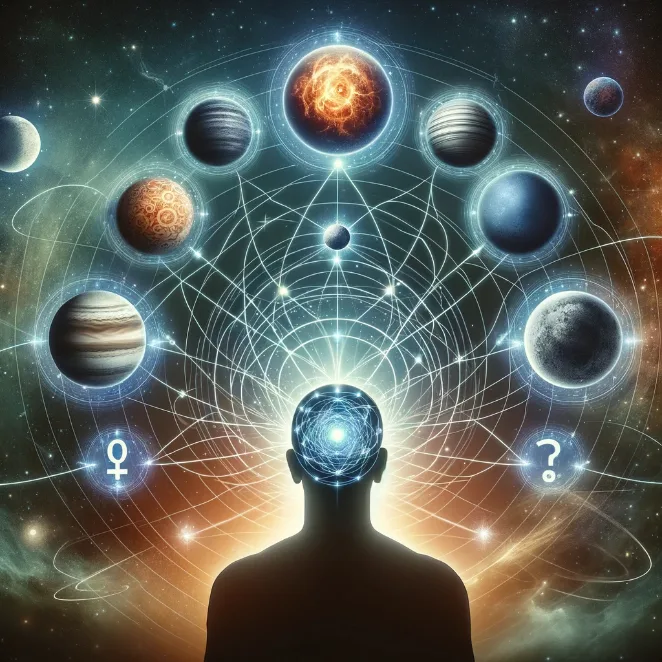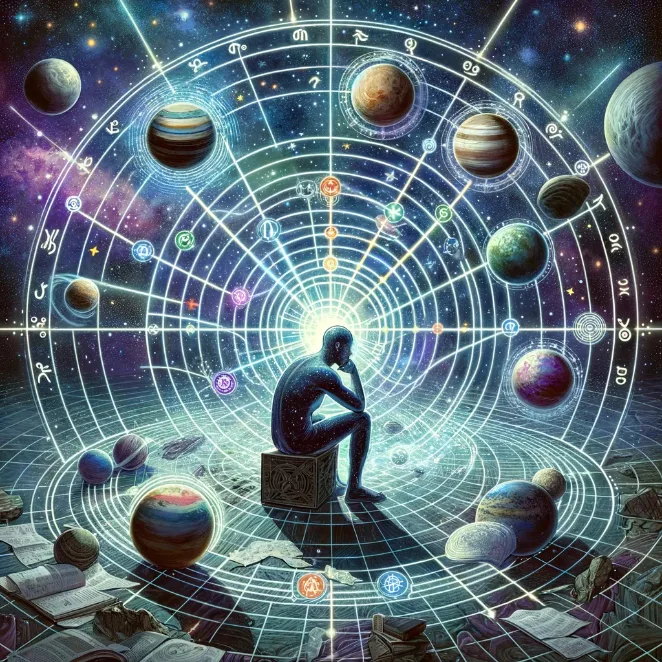
Astrology and Mental Wellness: Navigating the Celestial Tide
Astrology, often seen as a mystical art, intricately links our mental wellness with the movements of celestial bodies. This ancient practice transcends mere fortune telling, offering profound insights into the human psyche. By understanding the influence of planetary positions and transits, we can gain a deeper awareness of our mental states, behaviors, and potential paths to balance and well-being. This article delves into the planetary influences on mental health and the significance of their transits and cycles in our journey towards mental wellness.
article by Priya Deshmukh
Planetary Influences on Mental Health
Each planet in astrology governs specific aspects of our psyche, impacting our emotional and mental landscape. For instance, Mercury rules communication and cognitive processes, influencing how we think, learn, and exchange ideas. A well-placed Mercury can signify mental agility and effective communication, whereas its affliction might lead to confusion or misunderstandings. Venus, the planet of love and values, affects our emotional attachments and pleasure, playing a role in our emotional fulfillment. Mars governs energy and aggression, impacting our drive and how we assert ourselves. Understanding these planetary influences can provide valuable insights into our mental strengths and vulnerabilities, guiding us towards achieving mental harmony and resilience.
The Moon: Reflections of the Inner Self
The Moon, in astrology, is deeply connected to our emotions, instincts, and subconscious patterns. Its position in the birth chart reveals our emotional nature and how we instinctively react to situations. A harmonious Moon placement can indicate emotional stability and intuitive strength, while a challenging placement might suggest emotional upheavals or deep-seated insecurities. Tracking the Moon's transit through the zodiac can also offer insights into our changing emotional tides, helping us navigate periods of emotional sensitivity or introspection more effectively.

Sun Sign and Mental Personality
The Sun sign, representing our core identity, significantly influences our mental wellness. It shapes our confidence, vitality, and the way we express our personality. A Leo Sun, for instance, might display a confident and outgoing mental disposition, while a Pisces Sun could indicate a more introspective and empathetic mentality. Understanding our Sun sign can help us embrace our authentic selves and manage mental wellness in a way that aligns with our inherent nature.
Planetary Transits and Mental Cycles
Planetary transits - the movement of planets across different zodiac signs - bring shifts in our mental and emotional states. For example, Saturn's transit, often called Saturn Return, marks a significant phase of maturation and reassessment of life goals. This period can bring mental challenges but also opportunities for growth and stability. Jupiter's transit often brings expansion and optimism, providing a boost to our mental outlook. Recognizing these cycles can prepare us for potential mental shifts, allowing us to harness these energies for personal development and mental healing.

Planetary Transits and Their Mental Implications
Saturn's Return: The Crucible of Maturity
Saturn's Return, a significant astrological milestone, marks a time of maturation and reassessment of one's life path. It’s a period ripe for introspection, often bringing forth challenges that catalyze personal growth and mental fortitude. This transit demands an honest evaluation of life choices and goals, urging individuals to shed outdated patterns and embrace their true potential.
Jupiter's Transit: Expanding Mental Horizons
Jupiter's Transit heralds a phase of expansion and optimism, opening doors to new mental and philosophical vistas. This period encourages the exploration of fresh ideas and perspectives, fostering a sense of mental liberation. It’s an ideal time to broaden one's understanding and embrace opportunities for personal and intellectual growth.
Mercury Retrograde: Reflective Reshaping
Often feared for its tendency to muddle communication, Mercury Retrograde is, in essence, a call for mental introspection and reevaluation. This phase offers a chance to revisit and refine our thoughts, communication strategies, and mental processes. It’s an opportune time to resolve lingering issues and gain clarity on previously perplexing matters.
Venus Transit: Harmonizing Emotions and Mind
Venus Transit, governing emotional connections and expressions, influences how we align our mental state with our emotional needs. This period focuses on balancing emotional well-being with mental health, emphasizing the importance of nurturing relationships and personal values that contribute to our overall psychological state.
Mars Retrograde: Confronting and Channeling Inner Fire
Mars Retrograde can lead to a dampening of our usual drive, sometimes surfacing repressed frustrations or anger. This transit invites a reevaluation of our approach to conflict, assertiveness, and action. It’s a period to address unresolved internal battles and channel our energy constructively.
Uranus Transit: Embracing Mental Evolution
Uranus Transit is synonymous with sudden shifts and breakthroughs. This period challenges mental rigidity, urging a flexible and open-minded approach. It’s a time ripe for innovative thinking and embracing unconventional ideas that can revolutionize our mental framework.
Neptune Retrograde: Diving into the Subconscious
During Neptune Retrograde, the focus turns inward, enabling a deeper exploration of our subconscious motivations and patterns. This introspective phase is conducive to uncovering hidden aspects of our psyche, facilitating a greater understanding of our intuitive and spiritual dimensions.
Pluto Transit: The Transformational Forge
It’s is a profound period of inner metamorphosis, compelling individuals to confront their deepest fears and psychological shadows. This transit demands courage to face the darker aspects of the psyche, leading to significant mental and emotional transformation and growth.

Navigating Retrogrades for Mental Clarity
Retrogrades, particularly of Mercury, are renowned for causing communication snafus and mental fog. However, they also offer opportunities for reflection and revisiting unresolved issues. A Mercury retrograde can be a time to review and rethink our mental approaches, providing a chance to resolve lingering thoughts or communication issues. Understanding and preparing for these periods can help minimize their disruptive impact and turn them into periods of productive introspection.
Astrology offers a unique perspective on mental wellness, providing a roadmap to navigate the complex interplay between our mind and the cosmos. By understanding the influences of our astrological chart and the ongoing celestial cycles, we can find harmony and balance in our mental and emotional lives. Astrology doesn't dictate our fate but empowers us with knowledge to align with the cosmic flow and cultivate mental well-being.
Published: 11/15/2023
Modified: 11/15/2023
More predictions
Come back here soon to learn more about yourself and your future


The Role Of The Moon In Human Life
From ancient folklore to modern science, the Moon has always captivated the human imagination. As our closest celestial neighbor, it wields a mysterious power over our lives, both mythologically and physically. Let's dive into the manifold ways the Moon impacts human existence.


Mercury as the Morning Star: Celestial Herald of Dawn
Mercury, the smallest member of our solar system, extends its influence far beyond its physical size, captivating our imagination both as an astronomical body and a mythological symbol. Its unique orbital path around the Sun allows it to shine as both the Evening Star and the Morning Star at different times. This article focuses on Mercury's intriguing role as the Morning Star, exploring not only its astronomical journey but also the rich tapestry of symbolism it weaves as it heralds the break of dawn.


Unveiling the Mysteries of the Minor Arcana
In the world of tarot, the Minor Arcana often plays a supporting role to the more famous Major Arcana, yet it holds profound insights into our daily lives. Comprising 56 cards, the Minor Arcana delves into the nuances of everyday experiences, emotions, challenges, and opportunities. This article explores the structure, symbolism, and interpretation of the Minor Arcana, offering a deeper understanding of its role in tarot readings.